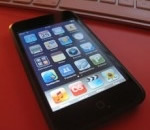
With a furrowed brow and a deep breath, 9-year-old Dallis Engel pressed down on the screen of her iPod touch.
Then, she began to read.
“My brother William is a fisherman,” she said, using a finger to trace words in Patricia MacLachlan’s book, Sarah, Plain and Tall.
The fourth-grader stumbled over pronunciations and skipped words as an application recorded her voice. When she finished the passage, she glanced over at her teacher, Kelly Turcotte, and explained her next step.
“I have to listen to it and make sure it’s perfect,” she said. “If you sound like a robot, you have to do it again.”
In Oregon’s Canby School District, it’s a familiar scene. While other school systems across the nation have banned personal cellular phones or mobile internet devices, the Canby School District is one of a growing number of districts that is fully embracing mobile learning technology.
During a time of steep budget reductions—employees must take 14 furlough days this school year—Canby has issued an iPod touch to every third-grader, challenging the idea that digital technology exists largely as a distraction for a plugged-in generation.
More information on mobile learning programs:
Launching a Mobile Learning Program: What Every School Leader Should Know
Since implementing a pilot project at Philander Lee Elementary School three years ago, the district has used about $250,000 in state and federal grant and rebate money to purchase the iPod touches, a portable media player that connects to the internet through a Wi-Fi network.
In addition, the parent-teacher association at Lee Elementary raised about $12,000 to buy 60 iPod touches for the school’s fourth- and fifth-graders, and another parent organization pitched in about $15,000 for 30 iPads at Eccles Elementary School.
The choice of equipping third-graders first was intentional, according to Joseph Morelock, the district’s technology coordinator. The third grade is the first to take state tests, and administrators are eager to help students pass math achievement standards that recently have been raised.
In presentations, Morelock has shown that several classrooms using the iPod touches generated better test scores than the district average. He looks at iPod touches and other mobile learning devices as unparalleled tools that can be used in nearly every class.
“Every kid now has [his or her] own dictionary, calculator, graphing calculator, [and] connection to the internet,” he says.
Turcotte and other teachers say the devices enthuse students, giving them the opportunity to practice multiplication using animated games, listen to books on iTunes, or record their own reading voices.
“These are the kids who hated reading, but now there are all these things you can do on that iPod Touch,” said Turcotte, who heads a language arts class for struggling fourth-graders. “Suddenly, they feel like readers.”
Students also learn at a comfortable pace, she said. Now, they can go back and practice a word or a math problem they’ve missed, minus the embarrassment.
More information on mobile learning programs:
Launching a Mobile Learning Program: What Every School Leader Should Know
For their part, third- and fourth-graders mostly praise the goofy multiplication games, which have students play tic-tac-toe or combat aliens.
Engel says books become more exciting with the iPod touch. Students often research settings of books on the internet or listen to book recordings.
“There are all these sound effects,” Engel said. “It makes you want to keep on reading and to know what happens next.”
As budget cuts continue to loom, public perception has become an issue for schools dealing with dozens of flashy digital tools. But Superintendent Jeff Rose defended the move to expand Canby’s iPod program, saying the money comes from grants and rebate dollars that cannot be used for teacher salaries.
Besides that, he said, the school board had made the decision a few years ago to maintain its ed-tech investment: “In some ways, it jump-started this idea that technology needs to be somewhat of a funding priority.”
Canby’s emphasis on using technology to improve teaching and learning began with former Superintendent Deborah Sommer, who in 2006 was chosen by eSchool News as one of its Tech-Savvy Superintendent Award winners.
The district’s efforts at infusing technology in the classroom are attracting notice. Districts from as far as Alaska and Hawaii are looking to tour Canby’s classrooms, and Apple recently named Canby’s technology innovation grant project an Apple Exemplary Program for 2010-11.
Even with many districts looking at multimillion budget gaps next year, Morelock would not be surprised if Canby parents and educators pour more money into ed tech.
“People like to bet on a winner,” Morelock said. “When they see kids doing well and kids getting excited about school, they want to get on board.”
More information on mobile learning programs:
Launching a Mobile Learning Program: What Every School Leader Should Know
- ‘Buyer’s remorse’ dogging Common Core rollout - October 30, 2014
- Calif. law targets social media monitoring of students - October 2, 2014
- Elementary world language instruction - September 25, 2014



Comments are closed.